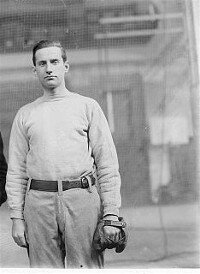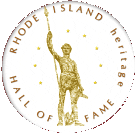Inductee Details
< Back

Andrew "Andy" J. Coakley
(1882-1963) ~
Inducted 2013
Andrew James “Andy” Coakley was born in the predominantly Irish South Providence neighborhood of the City of Providence on November 20, 1882, the son of Irish immigrants. As a teenager he became a star sandlot pitcher for the St. Michael’s parish team then coached by “the King of the Sandlots,” the legendary Tim O’ Neil. After playing at Providence High School, Coakley enrolled at the College of the Holy Cross in Worcester, most likely on an athletic scholarship. At Holy Cross he performed so well that he attracted the attention of Connie Mack, who had just begun his legendary fifty-year career as manager of the Philadelphia Athletics in the newly-formed American League. Mack had been born and raised in East Brookfield, only ten miles west of Fitton Field, where Holy Cross played its games.
In an unsuccessful attempt to preserve Coakley’s collegiate eligibility, Mack renamed the young and promising hurler “Jack McAllister” when Coakley made his major league debut at season’s end on September 17, 1902. In that abbreviated year Coakley had a record of 2 and 1. At age 19, he was then the second youngest major leaguer.
According to Connie Mack’s biographer, the famed manager “scouted colleges and high school for players. He sought young, intelligent athletes who could develop plays.” Certainly Coakley was one of those. He finished his studies at Holy Cross as a part time student, and while in Philadelphia he enrolled for a year (1906) in the University of Pennsylvania Dental School.
Coakley’s major league career spanned the years 1902-1911. Its highpoint came in 1905 when the young righthander led the Philadelphia Athletics to the American League pennant. According to the Baseball Encyclopedia, he compiled a record of 20 victories and 7 defeats and led the league with a won-loss percentage of .741 (Baseball Reference.com gives these figures as 18 and 8). His earned run average in that banner year was 1.84, a figure that ranked in fourth in the league, right behind the immortal Cy Young, who registered a mark of 1.82.
Coakley was slight of build in his playing days at six-feet tall and 165 pounds, yet he had a lively fastball. After leaving the Athletics at the end of a disappointing 1906 season, he played briefly for the Cincinnati Reds and the Chicago Cubs. A labor dispute interrupted his major league career in 1909. He tried a comeback with the New York Highlanders in 1911 (later known as the Yankees), but he suffered a thumb injury on his throwing hand early in the season that forced his retirement as a player.
Over nine years, Coakley registered 60 wins with 59 losses (or 58 and 59 according to Baseball Reference.com). However, his career earned run average of 2.36 ranks him 21st all-time among major league pitchers with 100 decisions or more.
Though Coakley left the major leagues in June 1911, the most illustrious part of his baseball career lay ahead. In 1912 and 1913 he coached at Williams College in Williamstown, Massachusetts, and in 1914 he went to New York City to become Columbia University’s pitching coach. In the following year he became the Lion’s head baseball coach and remained in that capacity (except for 1919) until 1951--a total of 37 seasons.
Coakley’s most notable protégé at Columbia was Yankee-great, Lou Gehrig, whom Coakley closely mentored in 1923, especially regarding Gehrig’s fielding ability. As with many others whom Coakley coached, the Yankee great and Coakley remained good friends until Gehrig’s tragic early death in 1941.
In 1930, the Eastern Intercollegiate Baseball league was formed with Coakley’s assistance. It was composed of the eight Ivy League schools, plus Army and Navy. Coakley’s Columbia Lions won league crowns in 1933, 1934, and 1944. By the time of his retirement to devote full time to his successful insurance business, Coakley had compiled a record of 306-289-11. In recognition of his contribution to baseball, Coakley was inducted into the Helms Athletic Foundation Hall of Fame in 1954 and into the Collegiate Baseball Hall of Fame posthumously in 1969. On occasion he returned to Rhode Island to visit his mentor, Tim O’ Neil.
Andy Coakley died in New York City on September 27, 1963, less than two months short of his eighty-first birthday, after suffering a stroke. He was survived by his wife Martha. The couple had no children. During their 1906 honeymoon in Vermont, Coakley had “discovered” a local baseball standout by the name of Eddie Collins. He recruited this future Hall of Famer for Connie Mack.
Coakley and his wife of fifty-seven years are buried in Kensico Cemetery in Valhalla, Westchester County, New York.
- Dr. Patrick T. Conley
See more inductees in:
- Sports - Baseball
< Go back

